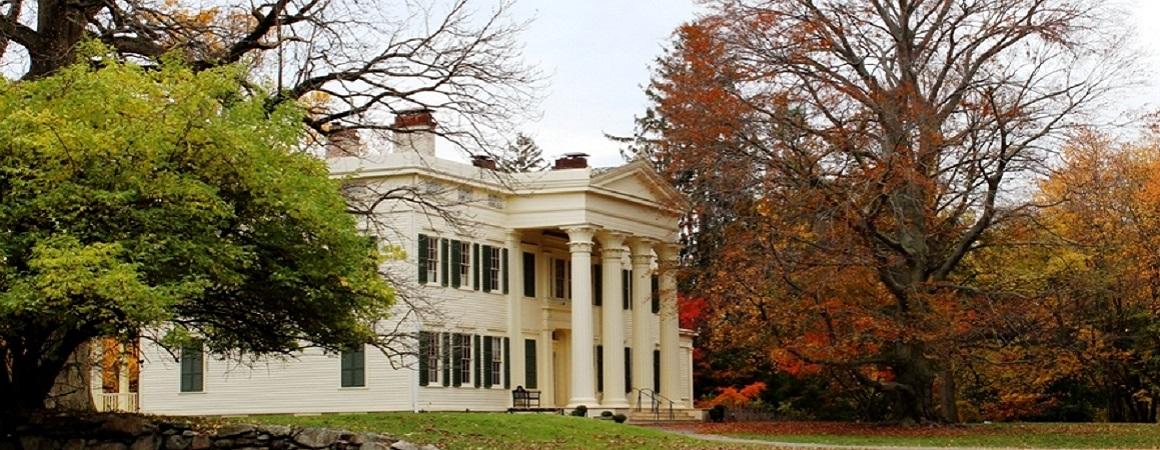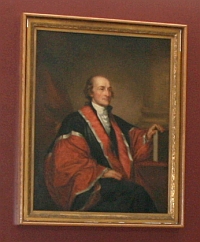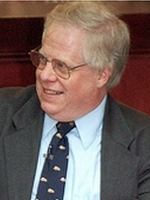John Jay Lecture

JOHN JAY LECTURE HISTORY
 Co-sponsored by the Jay Heritage Center, the John Jay Lecture honors the legacy of our country's first Chief Justice. John Jay (1745-1829), statesman and diplomat, was the first Chief Justice of the United States. Principal negotiator for the Treaty of Paris (1783) ending the War of Independence and establishing the United States, John Jay was also negotiator of the 1794 Jay Treaty that enabled the young nation to survive. A graduate of King's College, now Columbia University, John Jay was a delegate from New York to the First and Second Continental Congresses, and became President of the Congress in 1778. He not only helped to ratify the Declaration of Independence, but also provided the guiding hand that drafted the Constitution for New York State. As Secretary of Foreign Affairs from 1784-89, Jay negotiated treaties of commerce with Morocco and Prussia and joined James Madison and Alexander Hamilton in the writing of the Federalist Papers. In his extraordinary career of public service, Jay served in every branch of government and held more high offices than any other Founding Father.
Co-sponsored by the Jay Heritage Center, the John Jay Lecture honors the legacy of our country's first Chief Justice. John Jay (1745-1829), statesman and diplomat, was the first Chief Justice of the United States. Principal negotiator for the Treaty of Paris (1783) ending the War of Independence and establishing the United States, John Jay was also negotiator of the 1794 Jay Treaty that enabled the young nation to survive. A graduate of King's College, now Columbia University, John Jay was a delegate from New York to the First and Second Continental Congresses, and became President of the Congress in 1778. He not only helped to ratify the Declaration of Independence, but also provided the guiding hand that drafted the Constitution for New York State. As Secretary of Foreign Affairs from 1784-89, Jay negotiated treaties of commerce with Morocco and Prussia and joined James Madison and Alexander Hamilton in the writing of the Federalist Papers. In his extraordinary career of public service, Jay served in every branch of government and held more high offices than any other Founding Father.
The Jay Heritage Center. John Jay grew up at a farm in Rye, New York, and was buried there upon his death in 1829. That farm, which stretches form the Boston Post Road to the waters of the Long Island Sound, is now the home of the Jay Heritage Center, a non-profit corporation chartered by the New York State Board of Regents. The Center owns the Greek Revival house built at the site of Jay's childhood home by his son, Peter Augustus Jay, in 1838. It also owns a later Carriage House on the property built in Classical Revival style to complement the Jay mansion. The surrounding lands are Westchester County and New York State parkland, and the one-time farm is the center piece of the Boston Post Road Historic District, a National Historic Landmark. The Jay Heritage Center is restoring its two significant buildings for public use. The buildings will serve the public for visiting and as centers for education in American history, architecture and natural history of the historic district and the Long Island Sound area.
 The portrait of Justice Jay, which graces the Robert B. Fleming Moot Courtroom, is a replica of the 1794 original by Gilbert Stuart. It was executed in 1938 by Dean Keller and was donated to Pace Law School in 1983 by a John Jay family member with the assistance of the late Lino Lipinsky, at that time curator of the John Jay Homestead.
The portrait of Justice Jay, which graces the Robert B. Fleming Moot Courtroom, is a replica of the 1794 original by Gilbert Stuart. It was executed in 1938 by Dean Keller and was donated to Pace Law School in 1983 by a John Jay family member with the assistance of the late Lino Lipinsky, at that time curator of the John Jay Homestead.
The Chandler bronze of John Jay, a gift to Pace University School of Law by Nathan M. Shippee in 1980, is the work of award winning sculptress Elisabeth Gordon Chandler. For this bronze sculpture of Chief Justice John Jay, Ms. Chandler received the Bicentennial Medial from the Daughters of the American Revolution, the Pen and Brush American Heritage Award, and the Anny Hyatt Huntington Gold Medal. The bronze casting is the first and original of a limited edition of three castings of this work.
PAST JOHN JAY LECTURES
 April 29, 2014
April 29, 2014
Commissioner Rose Harvey, NYS Office of Parks, Recreation and Historic Preservation
"Stewardship of New York’s Cultural & Natural History”
 >> View lecture video (courtesy of the Jay Heritage Center)
>> View lecture video (courtesy of the Jay Heritage Center)
 March 25, 2012
March 25, 2012
Paul Finkelman
President William McKinley Distinguished Professor of Law and Public Policy at Albany Law School
"Jay is for Justice: From Slaveholders to Abolitionists, the Jay Family and Racial Justice"
 March 10, 2011
March 10, 2011
Herbert Sloan
Barnard College
"The Problem That Would Not Go Away--John Jay and the British Debts"
 >> View lecture video >> View lecture photos
>> View lecture video >> View lecture photos
 April 8, 2010
April 8, 2010
R. B. Bernstein
Author, The Founding Fathers Reconsidered
"The Intellectual Context of the 'Age of Experiments in Government'"
 March 19, 2009
March 19, 2009
Stephen L. Kass, Esq.
Partner and Founder, Environmental Practice Group, Carter Ledyard & Milburn LLP
"John Jay – Revolutionary Role Model for 21st Century Lawyers"
 November 12, 1999
November 12, 1999
Stewart Jay
Professor of Law, University of Washington School of Law
"Most Humble Servants: The Advisory Role of Early Judges"
 December 12, 1996
December 12, 1996
Roger G. Kennedy
Director of the National Park Service; (1979-1993) Director of the Smithsonian National Museum of American History
"A World of Possibilities: John Jay and the New Order of the Universe"
 December 12, 1994
December 12, 1994
Ene Sirvet
Editor of The Papers of John Jay, Columbia University
"John Jay as Chief Justice and Diplomat"
